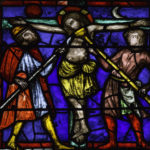We run our website the way we wished the whole internet worked: we provide high quality original content with no ads. We are funded solely by your direct support. Please consider supporting this project.

Avoiding the “S” Word: Sin
In our culture today, we don’t like to talk about sin. While most of us have a deep sense that something is off, that something is wrong with ourselves and the world, and many know or feel that they are guilty of something, this kind of talk is avoided. Instead, we evaluate ourselves by our own standards over against other people. We still have a measurement of right and wrong, but we make it up.
But the cross functions like a mirror held up before our eyes, showing us the full reality and the complete gravity of our sin.
On Christ was laid “the iniquity of us all.” “He himself bore our sins in his body on the cross” (1 Pet 2:24). God “made him to be sin who knew no sin” (2 Cor 5:21). In the crucified messiah we see the full horror of our act of violating the boundary between us and God.
In the cross, we also see the consequences of our sin. This is why Jesus was “wounded” and “crushed.” The wages of sin is death—physical as well as spiritual—and we see the death sentence carried out against all humanity on the cross (Rom 6:23).
While we prefer to avoid talking about sin, opting instead to set up our own measurements of good and evil, by doing so we are actually reinforcing the core sin from which we need to be freed. We get false worth through our sinful judgments of self and others as we use a false standard. Instead of seeing the true standard, we live as though we can make up the standards of good and evil.
But God himself is the standard. He wants nothing less than perfect union with himself, for this is the purpose for which God created the world. Anything that disrupts this union misses the mark, which is the definition of sin (harmartia).
Every act and every thought that does not flow out of trust (faith) that God is who he reveals himself to be—everything that is inconsistent with the purpose for which God created the world—misses the mark; it is sin.
The standard is perfection, as God is perfect (Matt 5:48). Everything we do, think, or say that is not perfectly consistent with the character of God condemns us. Whenever we fail to love God with all our heart, mind, and body, we stand condemned. Whenever we judge others instead of loving them as God has loved us, we stand condemned.
While we my develop our own standards by which we judge others, and some religious groups do this by coming down on certain sins that they happen to avoid while minimizing or ignoring the sins they routinely commit, the cross forces us to see something much more severe. We all stand equally condemned.
This is harsh reality and while it might not be popular, it’s true nonetheless. And it’s a truth that sets us free.
Only by becoming hopeless about our ability to live in perfect union with God on our own efforts can we begin to recover perfect union with God by simply being who God created us and died for us to be. Only by accepting that the gulf between us and God is unbridgeable through our own efforts can we stop trying to live up to some human-made standard through which we judge God, ourselves and others. And then we can simply accept the union God has sacrificially established with us in Christ.
The unsurpassable severity of our condemnation in Christ frees us to live in the unsurpassable love God has for us in Christ. The cursed tree on which Christ hung destroys the forbidden tree from which we ate.
—Adapted from Repenting of Religion, pages 150-154
Photo credit: jaci XIII via Visualhunt / CC BY-NC-SA
Related Reading

Why is the Bible so strict on prohibiting pre-marital sex? What’s the big deal?
Today in western culture people tend to have a rather “recreational” view of sex. It’s just a pleasurable physical activity we engage in. Even people who don’t consciously believe this are influenced by it , since we’re bombarded with this message every day through movies, television shows, radio, magazines, etc. Because we’re influence by this…

Which Came First: Death or Sin? (podcast)
Greg investigates the laws of nature, the nature of law, the fall of the powers, and the power of the fall in this enlightening episode that evolves right up to the climactic ending. Episode 561 http://traffic.libsyn.com/askgregboyd/Episode_0561.mp3

Sermon Clip: The Cross and the Tree
In this short sermon clip, Greg Boyd discusses how Christians should react to the world with love. In the Garden of Eden, Adam and Eve were tempted to eat from the Tree of the Knowledge of Good and Evil. They did this because they didn’t understand that God was protecting them. In this sermon, Greg…

Jesus Did Not Teach Ethical Behavior
Image by a2gemma via Flikr Paul teaches that love is not rude (1 Corinthians 13:4–5). If we forget that the New Testament is about the new life given us in Jesus Christ, we easily misinterpret this passage to be an ethical injunction. We read it saying, “Thou shall not be rude.” So in sincere obedience we set…

The Most Quoted Old Testament Verse
No other passage from the Old Testament is quoted more by New Testament authors than Psalm 110:1. Its frequent citation should cause us to pay attention to what is being said. It reads: The Lord says to my lord, “Sit at my right hand until I make your enemies your footstool.” In David’s day, it…

The Perfect Love of God
The Father, Son and Spirit exist as the infinite intensity and unsurpassable perfection of eternal love. We know this about the triune God not by speculation but because Jesus demonstrated that love (Rom 5:8) in his willingness to go to the furthest extreme possible to save us. When the all-holy God stooped to become our…
